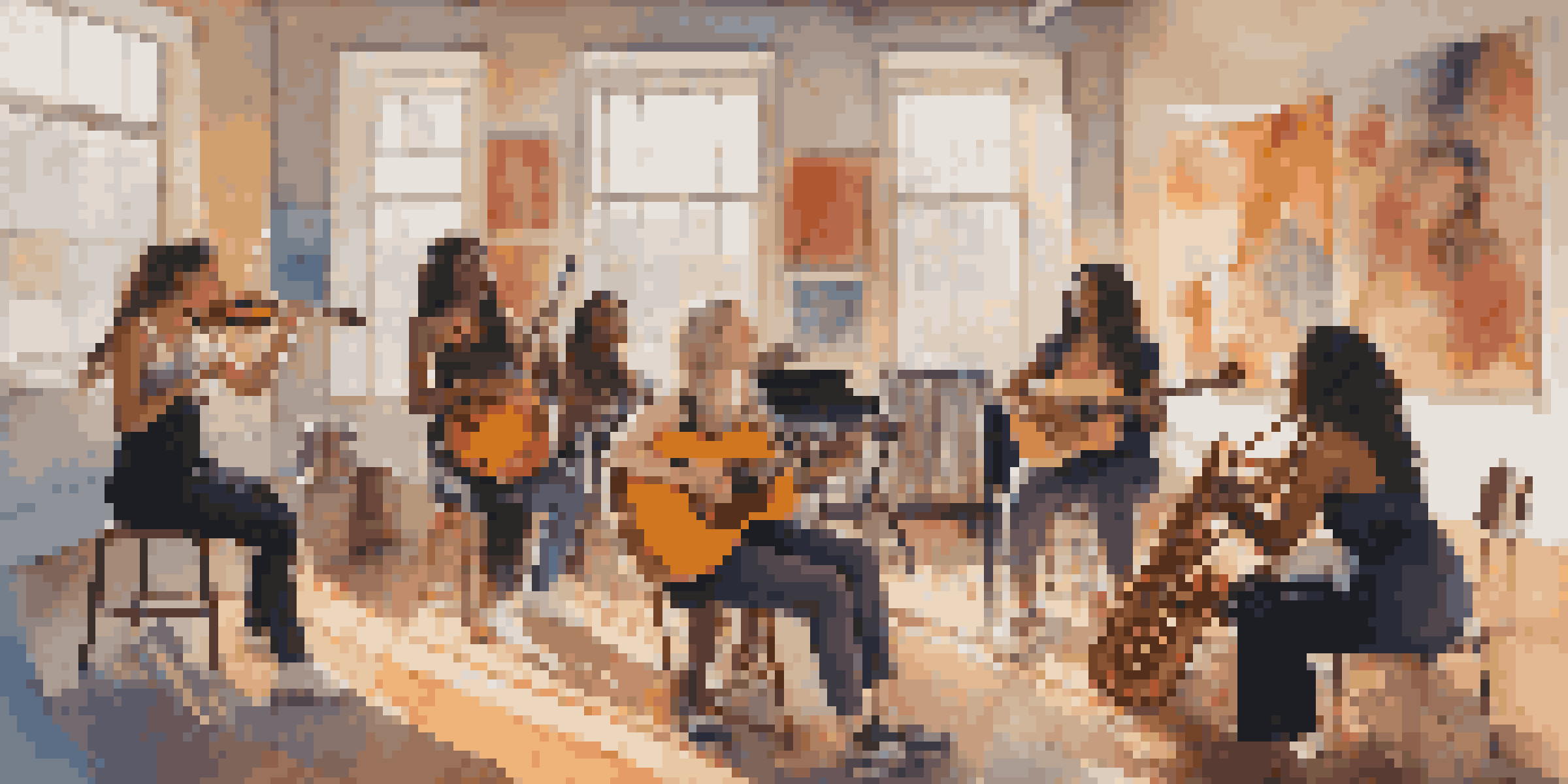Women in Music: The Fight for Representation and Equity

A Historical Overview of Women in Music
Throughout history, women have played a vital role in music, often overshadowed by their male counterparts. From classical composers like Clara Schumann to jazz icons like Billie Holiday, their contributions have shaped the musical landscape. However, even with such significance, many of these women remained largely unrecognized.
The future is not for the faint-hearted. It is for those who are willing to take risks and empower others.
The music industry has evolved, yet the historical marginalization of women persists. For instance, while female artists have gained fame, their achievements often come with a caveat: their representation in leadership roles and decision-making processes remains limited. This historical context is crucial to understanding the ongoing fight for equity in music.
Today, we see a resurgence of interest in women's contributions to music, but we must remember that the challenge isn't merely about recognition—it's about ensuring that women have equal opportunities to thrive within the industry.
Current Landscape: Women in the Industry
In today's music industry, female artists are breaking records and dominating charts, yet the structural barriers remain. Women make up a significant portion of music listeners, yet they hold fewer positions in executive roles and representation on festival lineups. This disparity highlights a critical issue: the need for systemic change to support women at all levels.

For instance, studies show that women comprise only about 20% of the songwriting and production teams in popular music. This lack of representation not only limits creative diversity but also perpetuates the cycle of inequity. The music industry must prioritize inclusion to truly reflect the voices of all artists.
Historical Marginalization Persists
Despite significant contributions, women in music continue to face recognition challenges alongside limited opportunities in leadership roles.
Moreover, the rise of social media has given women a platform to express their experiences and advocate for change. Movements like #MeToo have resonated across the music industry, prompting conversations about safety, equity, and the treatment of women in a historically male-dominated space.
Challenges Facing Women in Music
Despite progress, women in music continue to face numerous challenges, such as gender bias, harassment, and unequal pay. These issues can deter emerging talent from pursuing careers in the industry, creating a cycle of underrepresentation. For many, the dream of stardom comes with the harsh reality of navigating a complex and often hostile environment.
We need to reshape our own perception of how we view ourselves. We have to step up as women and take the lead.
Additionally, the pressure to conform to certain stereotypes or expectations can stifle creativity. For example, female artists might feel compelled to adopt a specific image or sound to gain mainstream acceptance, which can hinder genuine artistic expression. This struggle is not only personal but cultural, reflecting broader societal norms that dictate how women should behave.
These challenges highlight the need for mentorship and support systems tailored for women in music. By fostering an environment where women can share their experiences and learn from one another, the industry can begin to dismantle the barriers that have long held them back.
The Role of Advocacy and Organizations
Advocacy plays a crucial role in addressing the inequities faced by women in music. Various organizations, such as Women in Music and She Is the Music, have emerged to promote gender equality and provide resources for female artists. These groups work tirelessly to create networks, support systems, and opportunities for women to succeed.
For instance, initiatives that focus on mentorship and education can empower aspiring female musicians, helping them navigate the complexities of the industry. By connecting them with experienced professionals, these organizations foster a sense of community and shared purpose that can lead to positive change.
Need for Systemic Change
Women artists dominate charts but still encounter structural barriers that necessitate systemic reforms for true equity in the industry.
Moreover, advocacy extends beyond individual support; it calls for systemic change within the industry. By partnering with record labels, festivals, and other entities, these organizations push for policies that prioritize equity, ensuring that women’s voices are not only heard but valued.
Representation in Media and Culture
Media representation plays a pivotal role in shaping perceptions of women in music. From music videos to award shows, how women are portrayed can influence public opinion and inspire future generations. When female artists are celebrated for their talent rather than their appearance, it sends a powerful message about the value of authenticity.
However, the media often falls short in showcasing diverse female artists. The focus tends to be on a select few, leaving many talented women in the shadows. This lack of representation can perpetuate stereotypes and limit the visibility of women across different genres and cultures.
Encouragingly, there is a growing movement towards more inclusive representation in the media. Initiatives that highlight female musicians from diverse backgrounds not only enrich the cultural landscape but also empower young girls to pursue their dreams without the constraints of societal expectations.
The Impact of Social Media on Women Artists
Social media has transformed the music landscape, providing unprecedented opportunities for women artists to connect with their audiences. Platforms like Instagram, TikTok, and YouTube have become vital tools for self-promotion and creativity, allowing artists to share their stories on their own terms. This democratization of music is a game-changer for female musicians seeking visibility and independence.
Moreover, social media enables women to build supportive communities, where they can share experiences, challenges, and triumphs. These networks can be incredibly empowering, offering a sense of solidarity that encourages women to pursue their passions despite the obstacles they may face.
Empowerment Through Advocacy
Organizations advocating for women in music play a crucial role in promoting equality, providing resources, and fostering supportive networks.
However, this newfound freedom comes with its own challenges, such as the pressure to maintain a public persona. The expectation to constantly engage with audiences can be overwhelming, leading to burnout. Striking a balance between personal authenticity and public presence is crucial for sustaining a healthy career in the spotlight.
Looking Ahead: A Vision for the Future
As we consider the future of women in music, it’s essential to envision a landscape where equity and representation are the norms rather than the exceptions. This requires a collective effort from industry stakeholders, artists, and audiences alike. By advocating for change and supporting female talent, we can create a more inclusive and vibrant music scene.
Education plays a key role in this vision. By incorporating discussions around gender equality in music programs and institutions, we can nurture a new generation of artists who value diversity and collaboration. Encouraging young girls to explore their musical talents without fear of discrimination is vital for fostering future leaders in the industry.

Ultimately, the fight for representation and equity in music is ongoing. With the continued support of advocacy groups, the power of social media, and a commitment to change, we can look forward to a future where women in music are celebrated, empowered, and given the opportunities they deserve.